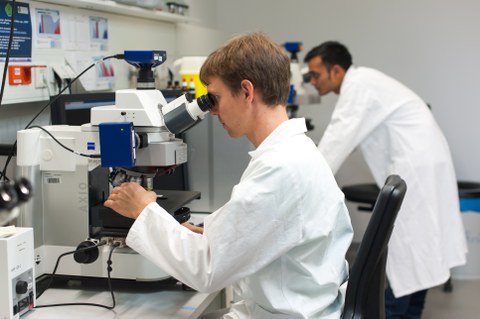Habilitation
Die Habilitation ist als weitere akademische Qualifikationsstufe traditionell im deutschen Hochschulsystem verankert und hat auch heute noch - trotz der Diversifizierung wissenschaftlicher Karrierewege - in vielen Disziplinen eine entscheidende Bedeutung für den Zugang zur Professur. Sie ist eine Hochschul- und Berufszulassungsprüfung, mit der die Befähigung zur selbstständigen Forschung und Lehre bescheinigt (Venia legendi) und der Weg zur Lebenszeitprofessur ermöglicht wird.
Üblicherweise befinden sich Habilitand:innen in einem befristeten Beschäftigungsverhältnis an einer Hochschule. Nach dem Wissenschaftszeitvertragsgesetz ist eine solche Anstellung auf einer so genannten Haushaltsstelle auf sechs Jahre beschränkt, was auch dem Zeitrahmen entspricht, der häufig für die Durchführung eines Habilitationsprojekts veranschlagt wird. Darüber hinaus besteht die Möglichkeit der Finanzierung über Drittmittelprojekte oder Habilitationsstipendien. Habilitand:innen sind weisungsabhängig gegenüber dem/der Inhaber:in der jeweiligen Professur und somit zuweilen in ihrer wissenschaftlichen Eigenständigkeit eingeschränkt.
Zulassung und Durchführung der Habilitation sind ähnlich dem Promotionsverfahren von den Fakultäten in den jeweiligen Habilitationsordnungen geregelt. Die Habilitation wird von einer Habilitationskommission durchgeführt, der mindestens sechs Habilitierte angehören müssen. Für die Habilitation müssen folgende Leistungen erbracht werden:
- Vorlage einer Habilitationsschrift oder der Nachweis gleichwertiger wissenschaftlicher Leistungen
- ein wissenschaftlicher Vortrag mit anschließendem Kolloquium und eine Lehrveranstaltung mit Diskurscharakter zum Nachweis der Eignung für die Lehre vor dem durch die Habilitationsordnung bestimmten Gremium, dem auch Studierendenvertreter aus dem betreffenden Fachgebiet angehören müssen.
Die Begutachtung der Habilitationsschrift erfolgt grundsätzlich durch drei Hochschullehrer:innen, von denen mindestens eine:r nicht der verleihenden Hochschule angehören darf. Der Doktorgrad kann um den Zusatz "habil." (Doctor habilitatus) ergänzt werden.
Maria Reiche Postdoctoral Fellowships
Die Maria Reiche Postdoctoral Fellowships unterstützen exzellente Postdoktorandinnen bei ihrem Vorhaben, selbstständig ein Drittmittelprojekt einzuwerben, um sich an der TU Dresden für eine wissenschaftliche Laufbahn mit dem Ziel Professur zu qualifizieren.
Antragsberechtigt:
promovierte Nachwuchswissenschaftlerinnen, deren Promotion nicht länger als sechs Jahre zurückliegt
Antragsfrist: Montag, 14. Juni 2021
Weitere Fördermöglichkeiten
Neben Habilitationsstipendien von Drittmittelgebern (z.B. Emmy Noether-Programm, Heisenberg-Programm) gibt es weitere interessante Fördermöglichkeiten, wie z.B. Reisekostenzuschüsse für Konferenzen oder Auslandsaufenthalte, Förderung internationaler Kooperationen zwischen Arbeitsgruppen (AGs) oder Förderangebote zur Entwicklung und Schärfung des wissenschaftlichen Profils. Die Graduiertenakademie und TU Dresden hält ein vielfältiges Förderangebot bereit. Verschaffen Sie sich gleich einen Überblick!
Bei Fragen rund um das Thema Finanzierung der Habilitation helfen Ihnen gern die Mitarbeiterinnen der Graduiertenakademie weiter. Vereinbaren Sie einfach einen persönlichen Gesprächstermin oder informieren Sie sich auf den Seiten der Graduiertenakademie.
Forschungsaufenthalte im Ausland dienen der Profilschärfung und Qualifizierung und spielen bei der Beantragung von Fördermitteln oder in Berufungsverfahren oftmals eine entscheidende Rolle.
Förderungen von längeren Auslandsaufenthalten (i.d.R. ein bis drei Jahre) bieten bspw. die DFG mit dem Forschungsstipendium, die Alexander von Humboldt-Stiftung mit dem Feodor Lynen-Forschungsstipendium oder die Europäische Union mit den Marie Curie-Individualmaßnahmen. Auch beim DAAD können im Rahmen des Programms „Jahresstipendien für Graduierte und Promovierte“ sowie dem Postdoc-Programm Auslandsstipendien mit einer Laufzeit von ein bis drei Jahren beantragt werden. Über diese von großen Förderinstitutionen angebotenen, fachübergreifenden Programme hinaus gibt es zahlreiche fach- bzw. länderspezifische Förderangebote, detaillierte Informationen hierzu finden Sie auf den Seiten der Graduiertenakademie unter der Rubrik Finanzierung.
Alternativ zur Stipendiensuche bei deutschen Förderorganisationen kann es sinnvoll sein, sich um eine Förderung im Zielland zu bemühen, auch wenn die Recherche hierzu meist aufwendig ist. Für den europäischen Forschungsraum kann dafür auf die Datenbank EURAXESS zugegriffen werden.
Kurzforschungsaufenthalte im Ausland werden insbesondere vom DAAD gefördert, von der DFG im Rahmen des Programms Sachbeihilfe sowie von der Fritz Thyssen Stiftung im Rahmen von Reisebeihilfen. Geisteswissenschaftler werden von der Max Weber Stiftung mit dem Programm Gerald D. Feldman-Reisebeihilfen unterstützt. Postdoktorand:innen der TU Dresden, die Mitglied der Graduiertenakademie sind können außerdem eine finanzielle Unterstützung von Kurzforschungsaufenthalten im Ausland (von bis zu 3 Monaten) beantragen.

